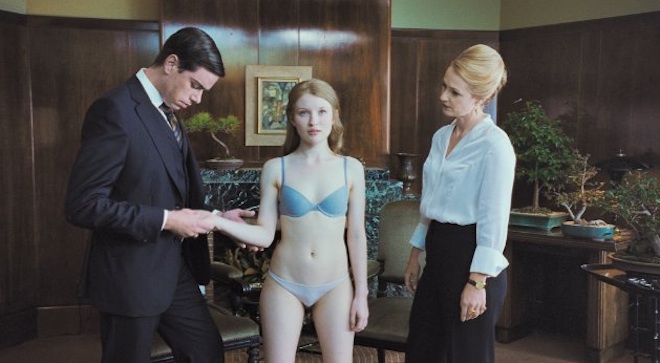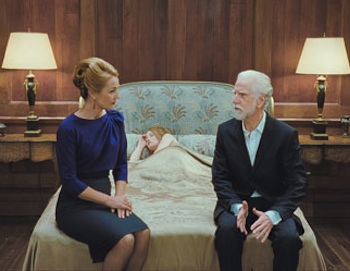Out of the dark comes Miss Lumière - Justinian's new film critic ... Her debut review is of Julia Leigh's directorial debut, Sleeping Beauty ... Reimagining the boardroom lunch
 It is tempting to think novelist and first time film director Julia Leigh derived some inspiration for Sleeping Beauty from her brief brush with the law - she qualified, but never practised.
It is tempting to think novelist and first time film director Julia Leigh derived some inspiration for Sleeping Beauty from her brief brush with the law - she qualified, but never practised.
Certainly there are scenes that could have (imaginatively at least) come straight from the rarefied world of big firm boardroom lunches: over-rich food prepared for too-rich men in richly decorated surrounds and served by S&M style waitresses, complete with labia-matching lippie (I kid you not).
All more than a bit decadent. Which is what makes this film both intriguing and enervating.
Like other films that focus on the decadent - Stanley Kubrick's Eyes Wide Shut and Pier Paolo Pasolini's Salo: The 120 Days of Sodom come to mind - its pleasures leave one fascinated, but frigid.
Plot-wise there's not much going on. Young university student Lucy, wonderfully underplayed by Emily Browning, pays her way with a number of part-time jobs, including sleeping with men she picks-up in bars.
She answers an ad for a job with a very different sort of sexual angle - a high class agency run by the chillingly elegant Clara (Rachael Blake).
 Emily Browning and Rachael Blake: no penetration
Emily Browning and Rachael Blake: no penetration
After serving fine food in her lingerie, Lucy is picked for a special assignment - to be drugged in the presence of various clients, all of them decrepit old men.
As Clara tells both Lucy and her clients, the only rule is no penetration.
 Peter Carroll: decadent decrepitudeAfter seeing what three of them (played by veterans Peter Carroll, Chris Hayward and Hugh Keays-Byrne) get up to while Lucy sleeps the sleep of the not-so-innocent, I wish the rule hadn't been obeyed.
Peter Carroll: decadent decrepitudeAfter seeing what three of them (played by veterans Peter Carroll, Chris Hayward and Hugh Keays-Byrne) get up to while Lucy sleeps the sleep of the not-so-innocent, I wish the rule hadn't been obeyed.
It's spooky and quite unsettling.
The most memorable is played by Carroll, who perfectly conveys decadence as a search for meaning, perverted.
His soliloquy to camera - a beautifully written excerpt from a short story - is one of the film's most touching scenes, although it is handled in an oddly disjointed manner.
Leigh's film suffers the same flaws common to many novice directors.
While the slow pace and silence have been deliberately employed to suggest the sad as well as the sinister, it feels as if Leigh lacked the confidence to use the full range of tools in her film kit.
A stronger soundtrack might have added much needed texture to Geoffrey Simpson's gorgeous, moody, sumptuous cinematography.
Nevertheless, the film intrigues. Browning's Lucy is a reckless, disconnected soul, seeking feeling through experience.
We get some idea of her real self, as opposed to the perfect angel she presents to the eyes of old men - in her tender relationship with Birdmann, a friend who is dying.
Ewan Leslie's performance in this enigmatic role is excellent. In fact, all the performances are uniformly good. Leigh clearly has a talent for talent direction, as well as mood.
What she doesn't quite have yet is a firm grasp of film language.
Hopefully, that will come with experience. Much like the language of life comes to Lucy at the film's strangely calming end.
The Guardian called Sleeping Beauty, "an elegant, if occasionally preposterous debut".
What more do you need?
Miss Lumière